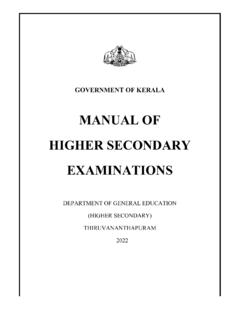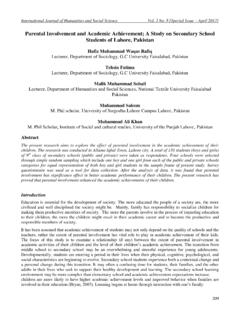Transcription of Role of Teacher in Enhancing Learning Achievement of Child
1 Role of Teacher in EnhancingLearning Achievement of Child &Emphasis on Teacher Skill Development, KnowledgeBuilding and ICTByNilay RanjanNaimur Rahman Role of Teacher in Enhancing Learning Achievement of ChildIntroductionThe role of education in improving the choice and quality of lives, Enhancing social and economic productivity, andinitiating the process of empowerment and redistribution of resources is well-documented in the past fifty eightyears of research. Despite India s commitment to provide free and compulsory education for all children until theycomplete the age of 14 and achieve Universalization of Elementary Education (UEE) and Millennium DevelopmentGoal (MDG) with substantial improvement in the quality, the average years of schooling has remained low at lessthan three years. Around 35 million children, in the age group of 6 to 14 years, are still estimated to be out of schooland the percentage of girls and other disadvantaged sections is disproportionately high among these state sponsored efforts at national, state and district levels are currently underway across India, aiming ataccelerating the pace of UEE and MDG.
2 In some areas, notable small-scale initiatives by non-governmental organizationsand other representatives of civil society are complementing state-sponsored has been a growing realization that a system-wide transformation is crucial for the attainment and sustainabilityof the goal of UEE and MDG with improved quality. The objectives of improved access and increased participation,reduced drop-out rates and enhanced Learning achievements cannot be met and sustained without improving thequality, effectiveness and efficiency of services in the elementary education system. The organizational structures,processes and practices determine the effectiveness of the whole system to a large extent, including the delivery ofthe final output and Achievement of the ultimate goals. Some of the initiatives that are underway specifically focus ondevelopment of academic as well as management processes, and intend to function as catalysts and harbingers ofthis systemic is a need to take stock of the critical managerial and accountability issues in elementary education in order toconsolidate the achievements, identify the gaps and set future goals.
3 Some initiatives have already been implementedin the past and there is sporadic evidence of institutional reforms having been initiated in some states. However, theavailable literature appears to be limited either to the activities and interventions undertaken by the project/programmes, or isolated examples in some areas. Even the interventions and processes initiated by these programmes,or other small initiatives, have rarely been assessed from the point of view of a system-wide transformation. Therefore,a fresh assessment of existing role and responsibility of Teacher in the context of class room management, inelementary education as a whole, was considered necessary to determine the future course of action to achieve thegoals of UEE and MDG, and raise levels of systemic effectiveness. In addition, a number of other measures initiatedin other sectors, like Local Self Government and Rural Development, have had a direct impact on elementary educationmanagement, and the last few years have witnessed rapid changes in this respect.
4 Any effort to understand andreview the elementary education system must take note of this fact as well. (Jha, Baxi, and Saxena, 2001).Author, Nilay Ranjan, Knowledge Coordinator-Education, OneWorld South Asia, Rahman, Program Manager, Oneworld South Asia, of the paperThis paper aims to understand the existing elementary education system through the structures and processes asthey exist currently, and how the teachers are playing a role in improving the Learning Achievement in overall schoolmanagement. The specific objectives of the paper are outlined below:(i)to take stock of the administrative and management processes undertaken by the Teacher in the class room, aswell as practices and processes within organizations,(ii)to assess and reflect on the effectiveness and efficiency of the management and administration of elementaryeducation,(iii) to identify critical issues which need to be addressed, in order to enhance effectiveness and efficiency instudent Learning , with particular reference to the need for Teacher development and provide solutions toenhance their efficiency(iv) to take stock of current training module for the Teacher training and identify demand-supply gap in terms ofskill development like information, communication and technology (ICT)
5 And capacity building in the knowledgemanagement Role of Teacher in Enhancing Learning Achievement of ChildRole of Teacher in school management to enhance learningIndia has one of the largest networks of schools in the world. During the last five decades the system has grownmanifold in size both in terms of institutions and enrolment. Some say, that the nature of Indian education systemshifted from an elite system to a system of mass education. For instance, the number of primary schools was around200,000 in 1950, which is at present more than 600,000. If one were to take into consideration the number ofalternate schools that have sprung up in recent years, and include the upper primary and secondary schools, thenetwork consists of more than a million , school education acquired immense importance in the post-Independence period and with the consequentexpansion of the system, the role of the school Teacher also underwent a significant transformation.
6 An importantconsequence of the expanding system of schools, with ever increasing enrolment and acquiring of mass character,has been the increase in complexity of school management. The changing pace of technology development like ICTand knowledge revolution has made the job of the Teacher more demanding. They are required and should beencouraged to assume the new roles and responsibilities for ICT to improve the quality of education and access toeducation by learners in an informal and non-formal education setting. (Govinda, 2002)The system demands new knowledge and skills from the Teacher and head teachers. It also demands greatercapability at the school level to respond to the emerging diversity in the student population and among thoseentering the teaching profession. In effect, changes in the characteristics of the system have made the role of theschool Teacher even more critical than what it was earlier.
7 Has the State, which is the main provider of education inthe country, responded to the changed reality? Has the Teacher become more empowered? Have adequate effortsbeen made to equip the Teacher to face the emerging challenges? What is the current reality with respect to status,roles and functions of the Teacher and the head teachers in India? And how can we come out from this challenge?These are few issues which need attention especially now when the country is moving towards becoming a knowledgecentre and quality education has become determinate in such overview of Teacher managerial function in the class roomHistorically, most of teachers restricted their role to teaching. The different government organizations and departmentsprovided a guide line for the role and responsibility of the Teacher . The Teacher plays multiple roles in the school . Therole of Teacher is assessed in terms of his/her attendance in the class, completion of the course and interpersonalrelation in the school .
8 Till now, hardly any indicator is developed to assess the performance of Teacher on the basisof Learning Achievement of the critical managerial functions of a Teacher in elementary education are similar to those in other sectors. These are:(i)Administration. Administration refers to the direction, control, management and organization of human andmaterial resources for educational growth and development.(ii)Personnel management. Planning and managing human resources is personnel management. It includesrecruitment, transfer and redeployment; promotional opportunities and performance appraisal systems,grievance redressal mechanisms and professional development issues.(iii)Planning. Planning is a systematic exercise of determining a future course of action in accordance withidentified objectives, needs, priorities and existing/likely capacities, within a given time frame, reflectingcost-effective choices.(iv)Financial management. Financial management refers to mobilization, deployment and efficient use of financialresources as per stated objectives and strategies.
9 (v)Supervision, monitoring and support. Monitoring and facilitation of teaching- Learning processes, and otherschool development activities, for Enhancing their quality through suitable tools, methods and focus is on school , because this is the unit where primary Learning takes place, and any effort to improvethe quality of processes should ultimately be reflected Role of Teacher in Enhancing Learning Achievement of Child (vi)Information management and communication. Management of information as an institutional resource is Information Management . It includes aspects of collection, processing, dissemination and use of information. Communication refers to the process of exchange of information and processes are not always clearly defined and are applied in unambiguous terms. It is common to comeacross a varied understanding of the same function by different organizations/units/ persons in the same sector. Theperception also depends, to a large extent, on the way the particular organization/unit/person handles the functionat its level.
10 This study has tried to understand and assess the processes against commonly defined functions. Theprocesses have been defined from the perspective of quality, effectiveness and efficiency. The stakeholders perspectiveis also in-built in these business operations, where standardized procedures based on uniform interpretations of guiding principlesare more common, the guiding principles of management functions in education could be interpreted effectively inmore than one way. The strength of a particular choice for a process in educational management also lies in whetherthe sequence brings about a change in totality as well as at different steps. The effectiveness is, thus, linked not onlyto the quality of output/ outcome, but also to the quality and impact of individual becomes a Teacher ?Typically, the posts of teachers are recruited at three levels - primary, upper primary/middle and secondary, but thereis no uniformity in this regard.




